Research
Escalating the operationalisation of Unisa's catalytic niche areas
Themed Innovating for the Future: Integrating Technology, Sustainability, and Humanity, Unisa held the official opening of the 2nd Catalytic Niche Area Research Symposium on 30 July 2025, bringing together academics, industry leaders and policymakers to discuss practical, research-driven solutions to some of the world’s most critical challenges.
Watch a recording of the proceedings of the symposium
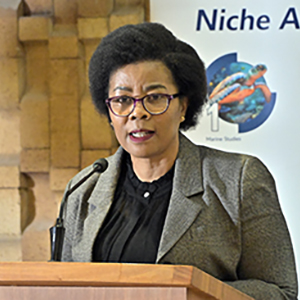
Professor Puleng LenkaBula, Principal and Vice-Chancellor: Unisa
Delivering the welcome address, Unisa’s Principal and Vice-Chancellor (VC), Prof Puleng LenkaBula, expressed her appreciation for the fact that the catalytic niche areas (CNAs) are becoming central to how Unisa is imagined, to its scientific agenda, and to its contribution to the national, continental and global developments for the betterment of societies. LenkaBula added: "We also need to ask ourselves what the value of education is, especially in higher education and in the context of the shifting geopolitical context and digitisation, including where people live in poverty and with underdeveloped systems."
LenkaBula remarked that through this symposium, there must be a recollection of how the CNAs were initiated during the inception of her tenure as VC in 2021. She added: "I once stated that my intentions as a leader at Unisa are not just to bring new ideas, but to reaffirm the university’s excellence in the areas of teaching and learning, research and innovation, and engaged scholarship, as well as the global impact of the institution, which the CNAs support." LenkaBula further acknowledged that Unisa was one of the functional universities during the Covid-19 pandemic, despite the unprecedented challenges it brought.
Lauding the leaders in Unisa’s research portfolio, the VC noted: "I appreciate that you saw the importance of institutionalising research that supports the CNAs. These areas contribute to rethinking and reclaiming Africa’s futures." She further acknowledged that the symposium takes place against the backdrop of challenges within the higher education sector, such as the financing of the sector and the global trade restrictions. According to LenkaBula, these challenges provide opportunities for universities to consider relevant and impactful solutions. "Unisa’s roots are embedded in African knowledge, social justice and academic excellence, enabling us to remain steady, even as we navigate the shifting global dynamics," she said. "Our responses must be strategic, innovative and collaborative."
Providing the context of the symposium, Prof Thenjiwe Meyiwa, Unisa’s Vice-Principal of Research, Postgraduate Studies, Innovation and Commercialisation, reiterated that Unisa is no longer conceptualising the CNAs, but is operationalising them. She added: "The robust consultations we had around these areas enable us to implement them." Meyiwa also expressed her appreciation of the symposium’s participants, such as industry experts and postgraduate students, as the event aims to link established scholars with emerging scholars to advance knowledge.
Additionally, Meyiwa said: "Through this symposium, we are shifting the academic culture as it relates to the CNAs, towards an agile ecosystem that is fit-for-purpose, operationalising and collaborative." She further asserted that this can be achieved through postgraduate development and strategic partnerships, and that these partnerships should not centre around who the university works with, but how impactful they are. "We want to transform South Africa to become relevant, responsible and responsive to pressing societal issues."
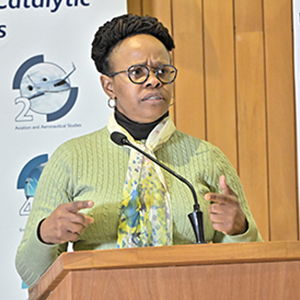
Prof Thenjiwe Meyiwa, Vice-Principal: Research, Postgraduate Studies, Innovation and Commercialisation: Unisa |
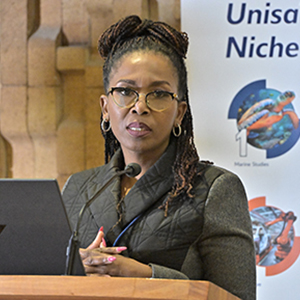
Advocate Thembelihle Mapipa, Executive Manager of Corporate Services and Strategic Partnerships: MKRI |
Advocate Thembelihle Mapipa, Executive Manager of Corporate Services and Strategic Partnerships at the Moses Kotane Research Institute (MKRI), delivered the keynote address on Skills for the Future – Focusing on Future-proofing the Maritime Industry: Skills for Development, Technology and Innovation for a Competitive Industry. Mapipa also serves as the Executive Manager of the Marketing and Communication Portfolio at the Association of Women Managers in the Maritime Sector in Eastern and Southern Africa. She shared that MKRI integrates evidence-based research, policy support, skills development and innovation facilitation to promote economic growth, especially in KwaZulu-Natal (KZN), where the institute is located. "Through coordinated programmes, research funding and collaboration, the institute strengthens local research capacity while aligning with provincial priorities to drive inclusive development," added Mapipa.
Mapipa stated that the maritime sector is at a crossroads; therefore, digital transformation, climate commitments and global competition demand the reimagination of how the sector operates. "Future-proofing is urgent as climate commitments require emission-free shipping, and global competition is increasing through smart ports," she highlighted. "Digital disruption is also reshaping how maritime business is done, and South Africa’s unemployed youth must be included in transformation."
Mapipa further mentioned the maritime sector's major human capital gaps, including outdated training curricula, a shortage of hybrid skills, the limited representation of women and youth, especially in technical and leadership positions, and a paucity in compliance training. She also shared some skills development solutions for the sector, which include curriculum modernisation, improving workplace-based learning, enhancing partnerships and benchmarking. She concluded: "I recommend the upskilling of maritime educators, establishing maritime skills innovation hubs with simulation-based learning, and incentivising inclusion through scholarship for women and youth."

* By Nancy Legodi, Acting Senior Journalist, Department of Institutional Advancement
** Photography by Shooheima Champion, Unisa Multimedia Office
Publish date: 2025-07-31 00:00:00.0
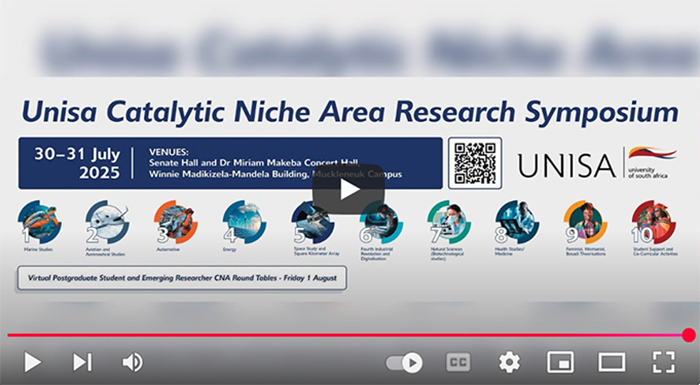


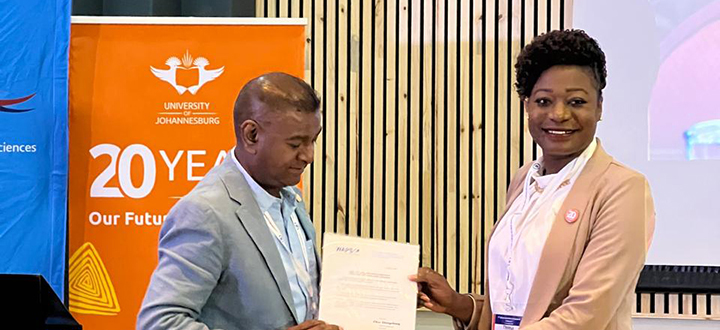 Unisa co-hosts major operations management conference
Unisa co-hosts major operations management conference
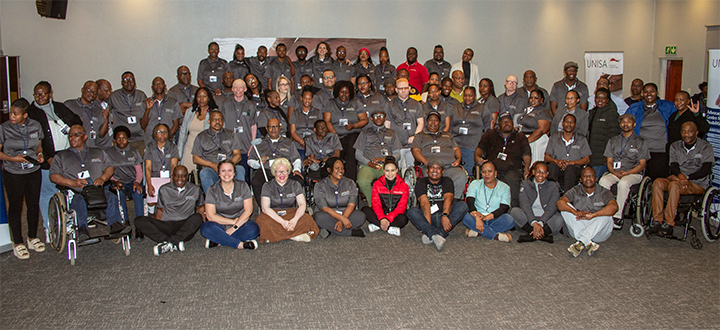 Strengthening disability-inclusive practices across higher education
Strengthening disability-inclusive practices across higher education
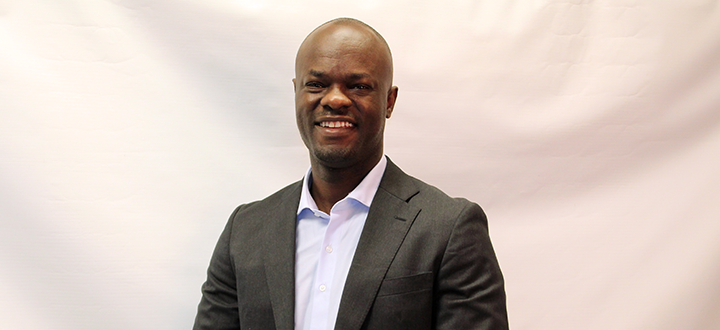 Unisa astrophysicist receives prestigious Royal Society award
Unisa astrophysicist receives prestigious Royal Society award
 Unisa's eminent women academics recognised for science excellence
Unisa's eminent women academics recognised for science excellence
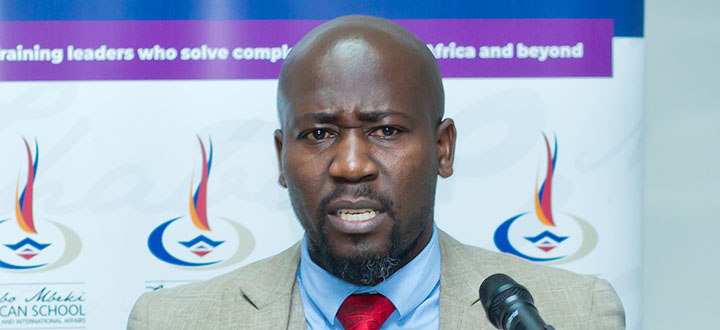 Illicit trade in Africa’s natural resources: Experts sound the alarm at Unisa seminar
Illicit trade in Africa’s natural resources: Experts sound the alarm at Unisa seminar